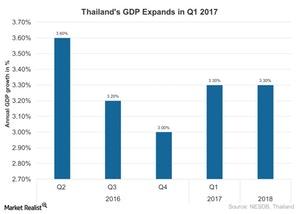Will Thailand Continue Its Economic Expansion in 2Q17?
Thailand saw impressive growth in 1Q17 due in part to external demand and public investment. Its GDP rose 3.3% in 1Q17 as compared to a 3% rise in 4Q16.
Jul. 14 2017, Updated 5:30 p.m. ET

Thailand’s economic growth
The second largest economy in Southeast Asia (ASEA), Thailand, saw impressive growth in 1Q17 with the support of external demand and public investment. Thailand’s (THD) GDP rose 3.3% in 1Q17 as compared to a 3% rise in 4Q16. Let’s look at Thailand’s GDP growth over the last year, updated on May 15, 2017, in the below chart.
Economic growth in 1Q17
Thailand’s (EEM) GDP growth in 1Q17 stood slightly above market expectations of a 3.2% expansion. It saw the strongest growth since 2Q16. The faster rise in private consumption, strong exports, and increased investments countered a sharp decline in government spending.
Rise across GDP components
Private consumption rose 3.2% faster as compared to the 2.5% increase in the previous quarter. The increased consumption was partly due to a substantial rise in farming revenues as well as non-farming revenues and improved consumer confidence. The increased spending on non-durable goods and durable goods including vehicles (CAR) and furniture items boosted expansion in 1Q17. On the contrary, the expenditure on semi-durable goods and net services fell in 1Q17.
Government spending increased at a slower pace of 0.2% as compared to a 1.8% rise in the previous quarter. The reduced expenditure in 1Q17 was expected in line with the planned decline in current budget allocation for 2017.
Public investment in Thailand (EEMA), the key growth driver in 1Q17, rose 9.7% as compared to 8.6% in 4Q16. Private investment dropped 1.1%, primarily due to the decline in the construction sector.
Expectations
According to a recent IMF report, Thailand’s economy is projected to grow at 3.2% and 3.3% in 2017 and 2018, respectively. Inflation is expected to be at the lower end of the 1.5%–2.5% range by 2018. Thailand’s economy will continue to be affected by the external environment, domestic political uncertainty, and structural issues in 2017. However, the improved domestic and external demand is expected to boost activity in 2Q17.
The iShares MSCI Thailand Capped ETF (THD) has gained about 1% in June 2017. So far in 2017, it has gained about 19% as of July 14, 2017.
Let’s look at the inflationary (TIPS) trend in Thailand in our next article.
